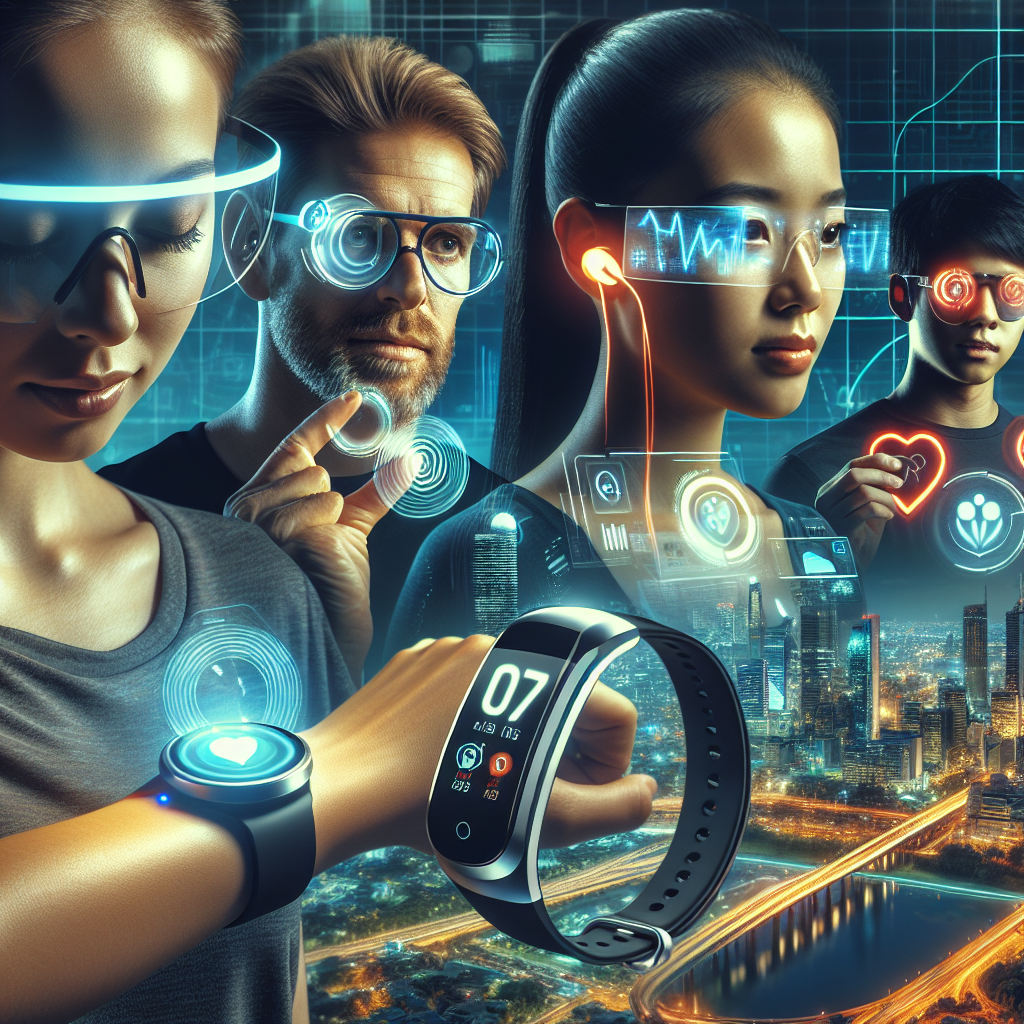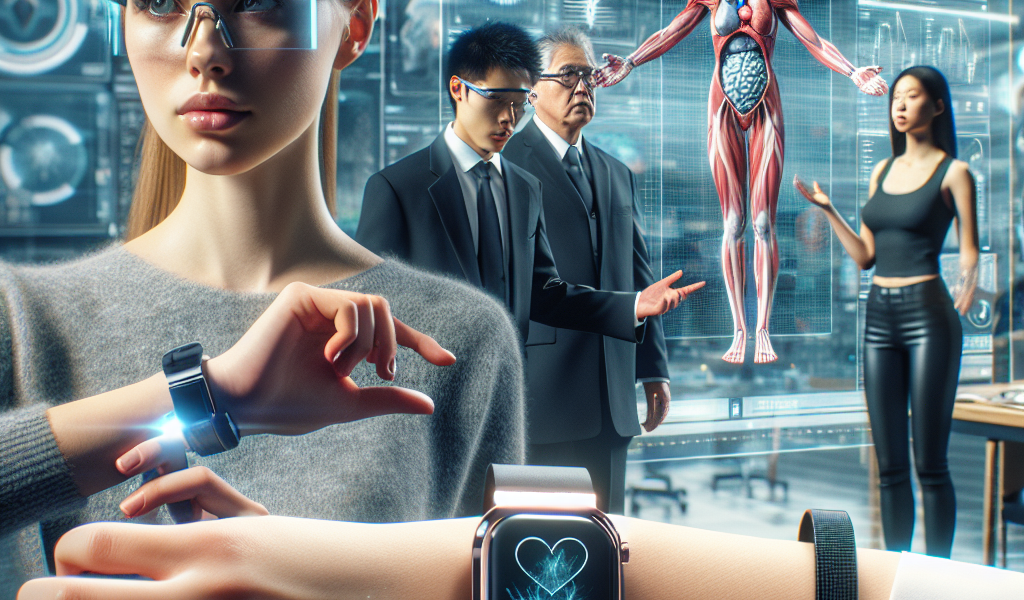-
Table of Contents
“Empowering Health, One Wearable at a Time.”
Introduction

The future of wearable health devices is poised to revolutionize the healthcare industry by integrating advanced technology with everyday life. These devices, which include smartwatches, fitness trackers, and biosensors, are becoming increasingly sophisticated, offering real-time monitoring of vital signs, physical activity, and even mental health indicators. As they evolve, wearable health devices are expected to provide more accurate and comprehensive data, enabling personalized healthcare and early detection of potential health issues. The integration of artificial intelligence and machine learning will further enhance their capabilities, allowing for predictive analytics and more effective health management. With continuous advancements in sensor technology, battery life, and connectivity, wearable health devices are set to become indispensable tools in promoting proactive health and well-being, ultimately transforming the way we approach healthcare.
Innovations in Wearable Health Technology: What to Expect in the Next Decade
The future of wearable health devices is poised to revolutionize the way we monitor and manage our well-being. As technology continues to advance at a rapid pace, the next decade promises a wave of innovations that will make these devices more sophisticated, accurate, and integral to our daily lives. One of the most exciting developments on the horizon is the integration of artificial intelligence (AI) and machine learning into wearable health technology. These advancements will enable devices to not only collect data but also analyze it in real-time, providing users with personalized health insights and recommendations. Imagine a smartwatch that can predict a potential health issue before it becomes serious, or a fitness tracker that can tailor workout plans based on your unique physiology and progress.
In addition to AI, the miniaturization of sensors and improvements in battery life will play a crucial role in the evolution of wearable health devices. Smaller, more efficient sensors will allow for continuous monitoring of a wider range of health metrics, from blood glucose levels to hydration status. This will be particularly beneficial for individuals with chronic conditions, as it will enable more precise and timely interventions. Moreover, longer battery life will ensure that these devices can be worn around the clock without the need for frequent recharging, making them more convenient and user-friendly.
Another significant trend to watch is the increasing focus on mental health. While current wearables primarily track physical health metrics such as heart rate and steps taken, future devices will likely incorporate features designed to monitor and improve mental well-being. For instance, wearables could use biometric data to detect signs of stress or anxiety and offer real-time interventions such as guided breathing exercises or mindfulness prompts. This holistic approach to health will help users achieve a better balance between their physical and mental well-being.
Interoperability and integration with other health technologies will also be a key factor in the future of wearable health devices. As electronic health records (EHRs) become more widespread, the ability of wearables to seamlessly share data with healthcare providers will be crucial. This will enable more comprehensive and coordinated care, as doctors will have access to a continuous stream of health data rather than relying solely on periodic check-ups. Furthermore, the integration of wearables with other smart devices, such as home health monitors and telemedicine platforms, will create a more connected and efficient healthcare ecosystem.
Privacy and data security will remain paramount as wearable health devices become more advanced and ubiquitous. Manufacturers will need to implement robust security measures to protect users’ sensitive health information from cyber threats. Additionally, clear and transparent data policies will be essential to build and maintain user trust. As consumers become more aware of the value and risks associated with their health data, they will demand greater control over how their information is collected, stored, and shared.
In conclusion, the next decade will bring remarkable innovations in wearable health technology, driven by advancements in AI, sensor miniaturization, and battery life. These devices will not only become more accurate and versatile but also more integrated into our daily lives and healthcare systems. With a growing emphasis on mental health and data security, the future of wearable health devices promises to be both exciting and transformative, offering new ways to enhance our overall well-being and quality of life.
The Role of AI in Enhancing Wearable Health Devices
The future of wearable health devices is poised for a significant transformation, driven by the integration of artificial intelligence (AI). As technology continues to advance at a rapid pace, AI is becoming an indispensable component in enhancing the functionality and effectiveness of these devices. This evolution is not just a leap in technological capability but also a step towards more personalized and proactive healthcare.
To begin with, AI’s ability to process vast amounts of data in real-time is revolutionizing how wearable health devices operate. Traditional wearables, such as fitness trackers and smartwatches, have primarily focused on monitoring basic metrics like steps taken, heart rate, and sleep patterns. However, with AI, these devices can now analyze complex data sets to provide deeper insights into an individual’s health. For instance, AI algorithms can detect subtle patterns and anomalies in heart rate variability, potentially identifying early signs of cardiovascular issues before they become critical.
Moreover, AI enhances the accuracy and reliability of wearable health devices. Machine learning models, a subset of AI, can be trained on extensive datasets to recognize and predict health trends with remarkable precision. This capability is particularly beneficial for managing chronic conditions such as diabetes. Wearable devices equipped with AI can continuously monitor glucose levels and predict fluctuations, allowing users to take timely action and avoid severe complications. This level of precision was previously unattainable with conventional monitoring methods.
In addition to improving accuracy, AI also plays a crucial role in personalizing healthcare. Wearable health devices can now tailor recommendations based on an individual’s unique health profile. By analyzing data from various sources, including medical history, genetic information, and lifestyle factors, AI can provide customized advice on diet, exercise, and medication. This personalized approach not only enhances the user experience but also promotes better health outcomes by addressing specific needs and preferences.
Furthermore, AI-powered wearables are transforming the way healthcare professionals interact with patients. These devices can continuously collect and transmit health data to medical practitioners, enabling remote monitoring and timely interventions. For example, AI can alert doctors to potential health issues, allowing them to reach out to patients before a condition worsens. This proactive approach reduces the burden on healthcare systems and ensures that patients receive timely care, even from a distance.
Another significant advantage of AI in wearable health devices is its potential to facilitate early diagnosis and prevention. By continuously monitoring various health parameters, AI can identify early warning signs of diseases such as cancer, Alzheimer’s, and Parkinson’s. Early detection is crucial for effective treatment, and AI’s ability to analyze subtle changes in health data can lead to earlier and more accurate diagnoses. This capability not only improves patient outcomes but also reduces healthcare costs by preventing the progression of diseases.
Despite these promising advancements, the integration of AI in wearable health devices also raises important ethical and privacy concerns. The collection and analysis of personal health data necessitate stringent measures to protect user privacy and ensure data security. It is essential for developers and policymakers to establish robust frameworks that address these concerns while fostering innovation.
In conclusion, the role of AI in enhancing wearable health devices is undeniably transformative. By improving accuracy, personalizing healthcare, enabling remote monitoring, and facilitating early diagnosis, AI is set to revolutionize the way we approach health and wellness. As we navigate this exciting frontier, it is crucial to balance technological advancements with ethical considerations to ensure that the benefits of AI-driven wearables are realized for all.
How Wearable Health Devices Are Revolutionizing Chronic Disease Management
Wearable health devices are rapidly transforming the landscape of chronic disease management, offering unprecedented opportunities for patients and healthcare providers alike. These innovative gadgets, ranging from smartwatches to fitness trackers, are not just trendy accessories but powerful tools that can monitor vital signs, track physical activity, and even predict potential health issues before they become critical. As technology continues to advance, the potential for these devices to revolutionize chronic disease management becomes increasingly apparent.
One of the most significant advantages of wearable health devices is their ability to provide continuous, real-time monitoring. For individuals with chronic conditions such as diabetes, hypertension, or heart disease, this constant vigilance can be life-changing. For instance, a smartwatch equipped with a heart rate monitor can alert a user to irregular heartbeats, prompting them to seek medical attention before a minor issue escalates into a serious problem. Similarly, glucose monitors that sync with smartphones can help diabetics keep their blood sugar levels in check, reducing the risk of complications.
Moreover, the data collected by these devices can be invaluable for healthcare providers. By analyzing trends and patterns in a patient’s health metrics, doctors can make more informed decisions about treatment plans and interventions. This data-driven approach allows for personalized care that is tailored to the unique needs of each patient, rather than relying on a one-size-fits-all model. Additionally, the ability to remotely monitor patients means that healthcare providers can intervene more quickly when issues arise, potentially preventing hospitalizations and improving overall outcomes.
The integration of artificial intelligence (AI) and machine learning into wearable health devices is another game-changer. These technologies can analyze vast amounts of data to identify subtle changes that might indicate the onset of a health issue. For example, an AI-powered wearable could detect a slight increase in a user’s resting heart rate over several days, suggesting the early stages of an infection or other health concern. By catching these issues early, patients can receive timely treatment, which is often more effective and less invasive than addressing problems that have progressed further.
Furthermore, wearable health devices are empowering patients to take a more active role in managing their health. With access to real-time data and insights, individuals can make more informed decisions about their lifestyle choices, such as diet and exercise. This proactive approach can lead to better health outcomes and a higher quality of life for those living with chronic conditions. Additionally, the social aspect of many wearable devices, which often include features for sharing progress and achievements with friends and family, can provide much-needed support and motivation.
Despite the many benefits, there are challenges to the widespread adoption of wearable health devices. Privacy and data security are significant concerns, as these devices collect sensitive health information that must be protected. Ensuring that this data is secure and used ethically is paramount to maintaining patient trust. Additionally, there is the issue of accessibility; not everyone can afford the latest wearable technology, which could exacerbate existing health disparities.
Nevertheless, the future of wearable health devices in chronic disease management looks promising. As technology continues to evolve, these devices will become more sophisticated, affordable, and integrated into our daily lives. By providing continuous monitoring, personalized care, and empowering patients, wearable health devices have the potential to significantly improve the management of chronic diseases, ultimately leading to better health outcomes and a higher quality of life for millions of people worldwide.
Conclusion
The future of wearable health devices is poised for significant advancements, driven by continuous technological innovation, increased consumer demand for proactive health management, and the integration of artificial intelligence and big data analytics. These devices are expected to become more sophisticated, offering real-time monitoring and personalized health insights, which will enhance preventive care and chronic disease management. Additionally, the expansion of telehealth services and the growing emphasis on remote patient monitoring will further solidify the role of wearable health devices in the healthcare ecosystem, ultimately leading to improved health outcomes and more efficient healthcare delivery.





